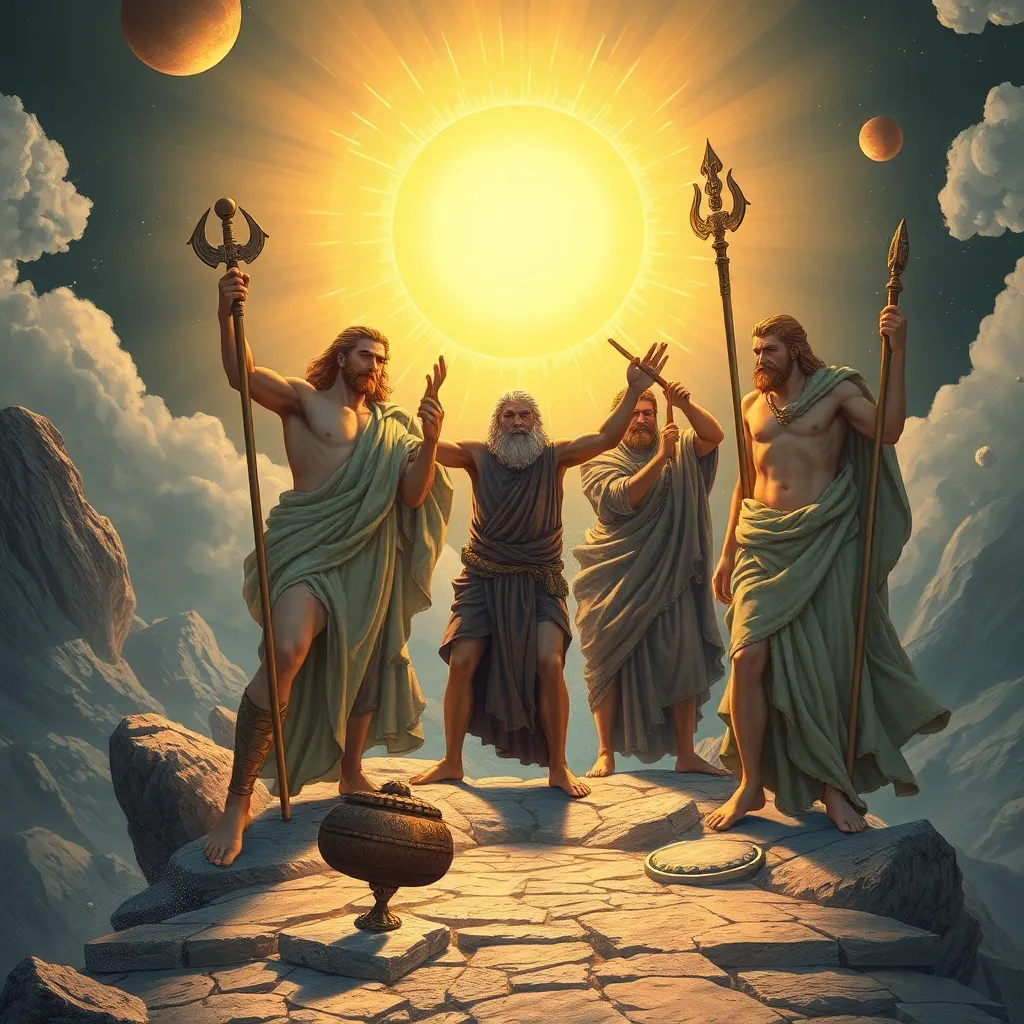The Role of the Gods in Shaping Human Destiny in The Odyssey
I. Introduction
“The Odyssey,” attributed to the ancient Greek poet Homer, is one of the cornerstones of Western literature and has captivated audiences for millennia. This epic poem narrates the long and perilous journey of Odysseus as he strives to return home to Ithaca after the Trojan War. Beyond its rich storytelling and complex characters, “The Odyssey” delves deeply into the theme of divine influence on human fate, where the gods play pivotal roles in the lives of mortals.
The theme of divine intervention is intricately woven throughout the narrative, showcasing how the gods shape the destinies of key characters, especially Odysseus. This article will explore the significant roles played by various deities in “The Odyssey,” highlighting their interventions, motivations, and the broader implications of these divine interactions on human experience.
II. The Pantheon of Gods in The Odyssey
The world of “The Odyssey” is populated by a rich pantheon of gods, each with distinct characteristics and spheres of influence. Some of the key deities include:
- Zeus: King of the gods, associated with thunder and justice.
- Athena: Goddess of wisdom and warfare, known for her strategic thinking.
- Poseidon: God of the sea, representing the uncontrollable forces of nature.
The hierarchy of the gods is significant, as it reflects their interactions with humans. Zeus, as the arbiter of cosmic order, oversees the other gods and their actions. Athena often acts as a protector of heroes, while Poseidon embodies the capriciousness of nature. In ancient Greek culture, belief in the gods was deeply embedded in daily life, influencing everything from politics to personal decisions.
III. Athena: The Protector and Guide
Athena emerges as a prominent figure in “The Odyssey,” serving as a mentor and protector for Odysseus. Her interventions are crucial at various points in the narrative:
- She guides Odysseus with wisdom, helping him devise clever strategies to overcome obstacles.
- Athena intervenes in the mortal realm, influencing other characters to assist Odysseus, such as Telemachus.
The significance of wisdom and strategy is underscored by Athena’s involvement, as she represents the ideal of intellect triumphing over brute strength. Through her guidance, Odysseus learns to navigate not only physical challenges but also the moral dilemmas he faces along his journey.
IV. Poseidon: The Force of Retribution
In stark contrast to Athena’s protective role, Poseidon embodies retribution and the tumultuous nature of the sea. His grudge against Odysseus stems from the hero blinding his son, Polyphemus the Cyclops. As a consequence, Poseidon unleashes his wrath upon Odysseus:
- Odysseus faces numerous trials at sea, including storms and shipwrecks, as Poseidon seeks to thwart his return home.
- The impact of divine anger illustrates the unpredictable nature of existence, where the whims of deities can alter the course of a mortal’s life.
This thematic representation of nature’s power emphasizes the fragility of human endeavors in the face of divine will, reinforcing the idea that mortals are often at the mercy of forces beyond their control.
V. Zeus: The Arbiter of Fate
Zeus, as the king of the gods, plays a crucial role in maintaining cosmic order and balance. His interventions in “The Odyssey” are often framed within the context of divine judgment:
- Zeus decides the fate of Odysseus and other characters, reflecting the interplay of fate and free will.
- He occasionally intervenes to mediate conflicts among the gods, ensuring that justice is served.
The balance between fate and free will is a recurring theme in the poem. While the gods exert significant influence, characters still make choices that lead to their destinies. This tension raises questions about human agency in the face of divine oversight.
VI. The Fates and Mortality
The concept of fate is intricately portrayed in “The Odyssey,” with the Fates (Moirai) embodying the inexorable threads of destiny that govern human lives. Their role in determining fates emphasizes several key ideas:
- Fate is depicted as a guiding force that even the gods must respect.
- The Fates weave the destinies of mortals, indicating that some outcomes are preordained.
This portrayal creates a tension between divine influence and personal agency, suggesting that while the gods can intervene, the ultimate fate of individuals is often beyond their control.
VII. Human Responses to Divine Influence
The characters in “The Odyssey” exhibit varied responses to the interventions of the gods, reflecting the complexity of human-divine interactions:
- Odysseus often displays both reverence and defiance, navigating the fine line between piety and hubris.
- Other characters, such as the suitors, demonstrate hubris by disrespecting the divine order, leading to severe consequences.
This interplay of piety and hubris shapes the moral lessons of the narrative, emphasizing the importance of respecting the gods and acknowledging their power in human affairs.
VIII. Conclusion
Throughout “The Odyssey,” the gods exert a profound influence on human destiny, shaping the lives and journeys of characters in significant ways. From Athena’s protective guidance to Poseidon’s vengeful wrath, the divine presence highlights the intricate relationship between mortals and the supernatural. The poem invites reflection on the broader implications of divine themes, encouraging readers to consider the nature of fate, free will, and the moral lessons woven into human experience.
The enduring relevance of these themes continues to resonate in literature and life, reminding us that the struggle between divine influence and human agency is a timeless aspect of the human condition.




